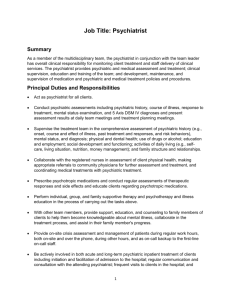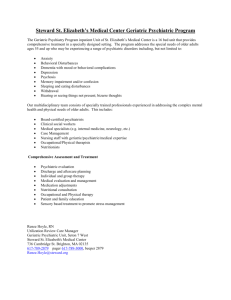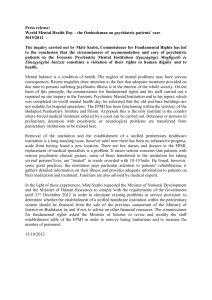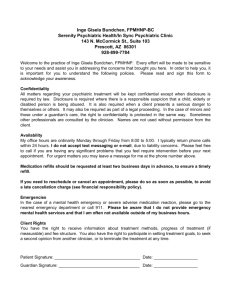RE: AB 1300 (Ridley-Thomas) Mental Health
advertisement
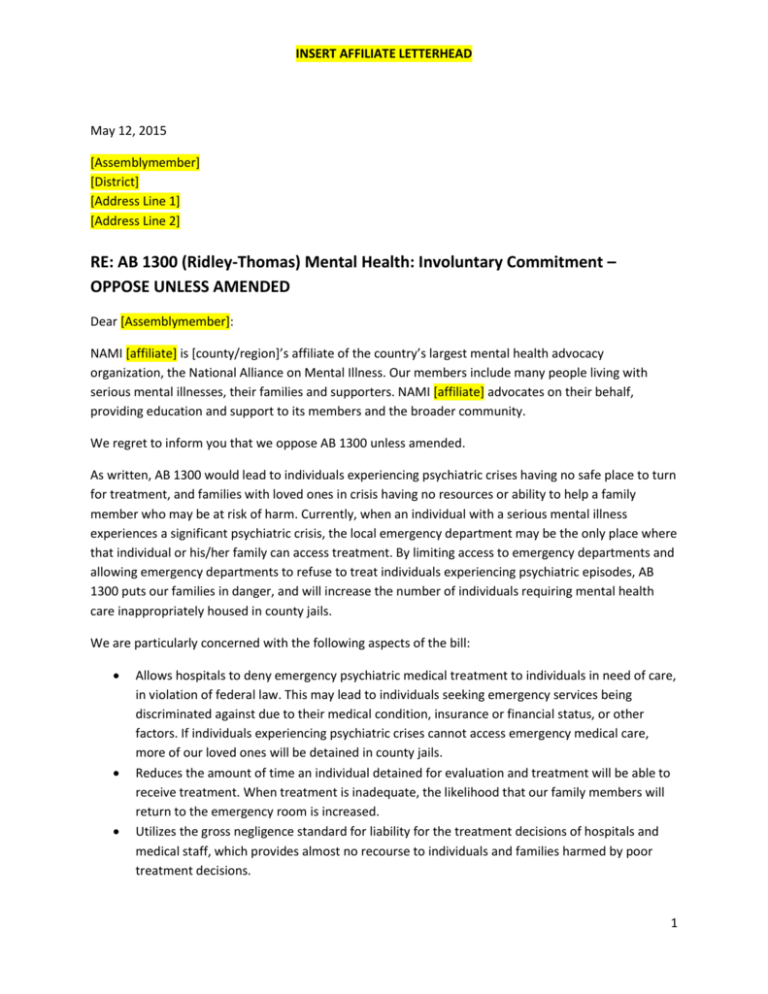
INSERT AFFILIATE LETTERHEAD May 12, 2015 [Assemblymember] [District] [Address Line 1] [Address Line 2] RE: AB 1300 (Ridley-Thomas) Mental Health: Involuntary Commitment – OPPOSE UNLESS AMENDED Dear [Assemblymember]: NAMI [affiliate] is [county/region]’s affiliate of the country’s largest mental health advocacy organization, the National Alliance on Mental Illness. Our members include many people living with serious mental illnesses, their families and supporters. NAMI [affiliate] advocates on their behalf, providing education and support to its members and the broader community. We regret to inform you that we oppose AB 1300 unless amended. As written, AB 1300 would lead to individuals experiencing psychiatric crises having no safe place to turn for treatment, and families with loved ones in crisis having no resources or ability to help a family member who may be at risk of harm. Currently, when an individual with a serious mental illness experiences a significant psychiatric crisis, the local emergency department may be the only place where that individual or his/her family can access treatment. By limiting access to emergency departments and allowing emergency departments to refuse to treat individuals experiencing psychiatric episodes, AB 1300 puts our families in danger, and will increase the number of individuals requiring mental health care inappropriately housed in county jails. We are particularly concerned with the following aspects of the bill: Allows hospitals to deny emergency psychiatric medical treatment to individuals in need of care, in violation of federal law. This may lead to individuals seeking emergency services being discriminated against due to their medical condition, insurance or financial status, or other factors. If individuals experiencing psychiatric crises cannot access emergency medical care, more of our loved ones will be detained in county jails. Reduces the amount of time an individual detained for evaluation and treatment will be able to receive treatment. When treatment is inadequate, the likelihood that our family members will return to the emergency room is increased. Utilizes the gross negligence standard for liability for the treatment decisions of hospitals and medical staff, which provides almost no recourse to individuals and families harmed by poor treatment decisions. 1 INSERT AFFILIATE LETTERHEAD AB 1300 does nothing to address the current lack of mental health crisis services. It does not provide services, or make existing resources operate in a more efficient manner. We are concerned that California has lost over 3,000 psychiatric beds as hospitals have chosen to reduce capacity within their hospital systems for these services. AB 1300 allows hospitals to further restrict psychiatric care by reducing the time for which an individual will receive treatment. During a hospital stay of inadequate length, not only will a patient’s condition not be fully stabilized, but family members are unlikely to fully informed and included. This significantly decreases the likelihood that follow-up care in an outpatient setting will occur, and increases the occurrence of costly future hospitalizations.1 Due to the fact that individuals in need of emergency psychiatric care would not receive adequate care under AB 1300, more individuals living with serious mental illness would be inappropriately detained in county jails following interactions with law enforcement. We support and are continuing to work on a number of reforms to divert individuals with serious mental illness out of the criminal justice system and into treatment. This includes providing increased training to law enforcement officers regarding mental illness and utilizing appropriate community resources for individuals experiencing psychiatric crises. Under AB 1300 it would be more difficult to obtain adequate psychiatric care from a hospital emergency department. We are therefore concerned that law enforcement would be more likely to take individuals to the county jail, rather than to treatment at an emergency department. This may be particularly true since the time period that individuals will be provided treatment is decreased under AB 1300, and law enforcement may be legitimately concerned that individuals discharged from the emergency department may not have received adequate treatment.2 At NAMI [affiliate], we put the best interest of individuals and families impacted by serious mental illness first. When an individual and family experience a psychiatric crisis that necessitates detention and emergency medical services, they need support and treatment from their community. The availability of this treatment saves lives every day. We believe our community has significant work to do on increasing the crisis stabilization services in the community. However, this bill as currently drafted will harm our families and communities. We would also be happy to work with you to find other ways to increase services for individuals and families impacted by serious mental illness. If you have questions, please contact [contact information]. We sincerely appreciate your dedication to this issue. Respectfully, [INSERT SIGNATURE] 1 Lamb, Richard H., MD, Weinberger, Linda E., PhD. J Am Acad Psychiatry Law 33:4:529-534 (2005). 2 ibid 2



